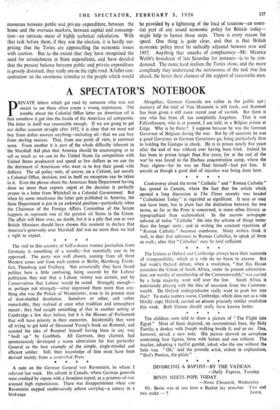A SPECTATOR'S NOTEBOOK p RIVATE letters which get read by someone
who was not meant to see them often create a wrong impression. The trouble about the Colonial Office letter on American oil is that somehow it got into the hands of the American oil companies. The letter in itself was reasonable enough. If we are going to get our dollar account straight after 1952, it is clear that we must not buy from dollar sources anything—including oil—that we can buy from sterling sources. That, from one point of view, is common sense. From another it is part of the whole difficulty inherent in *the Marshall Aid plan that America should be encouraging us to sell as much as we can to the United States (in competition with United States producers) and spend as few dollars as we can (to the detriment of Americans who want us to buy their goods with dollars). The oil policy rests, of course, on a Cabinet, not merely a Colonial Office, decision, and in itself no exception can be taken to it. Even the phrase about the American State Department having done no more than express regret at the decision is perfectly proper in a letter from Whitehall to a Colonial Government. But when by some mischance the letter gets published in America, the State Department is put in an awkward position—particularly when the Chairman of the Foreign Affairs Committee of the Senate happens to represent one of the greatest oil States in the Union. The affair will blow over, no doubt, but it is a pity that one or two British Ministers should have chosen this moment to declare that America's generosity over Marshall Aid was no more than we had a right to expect.


































 Previous page
Previous page